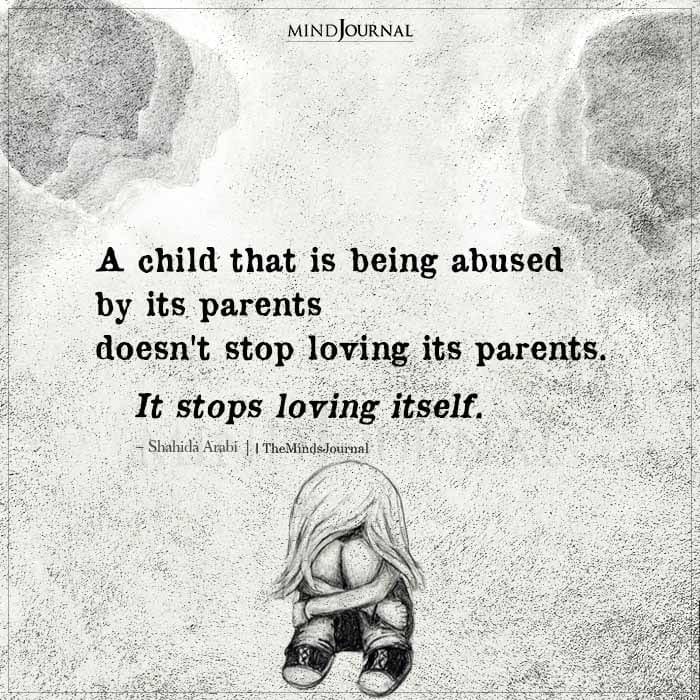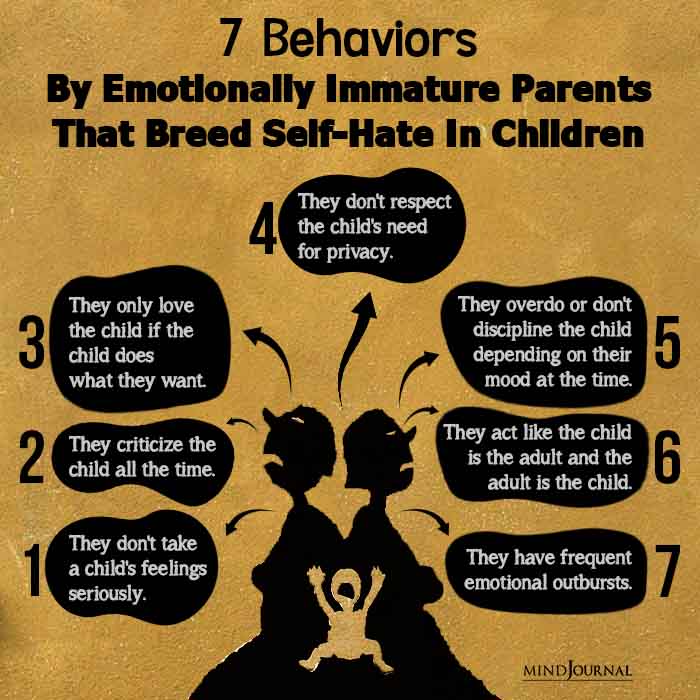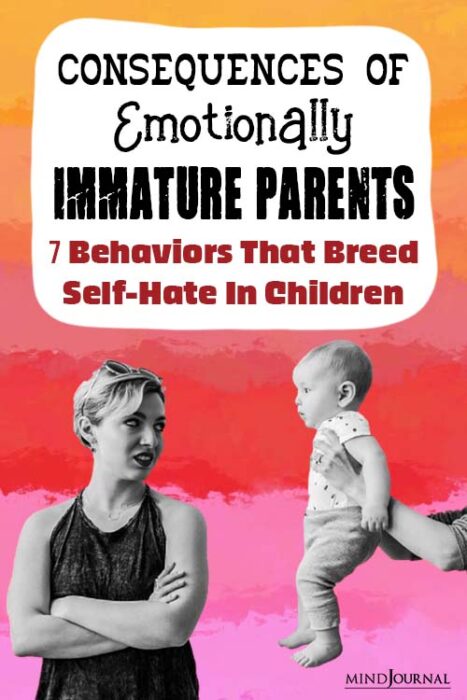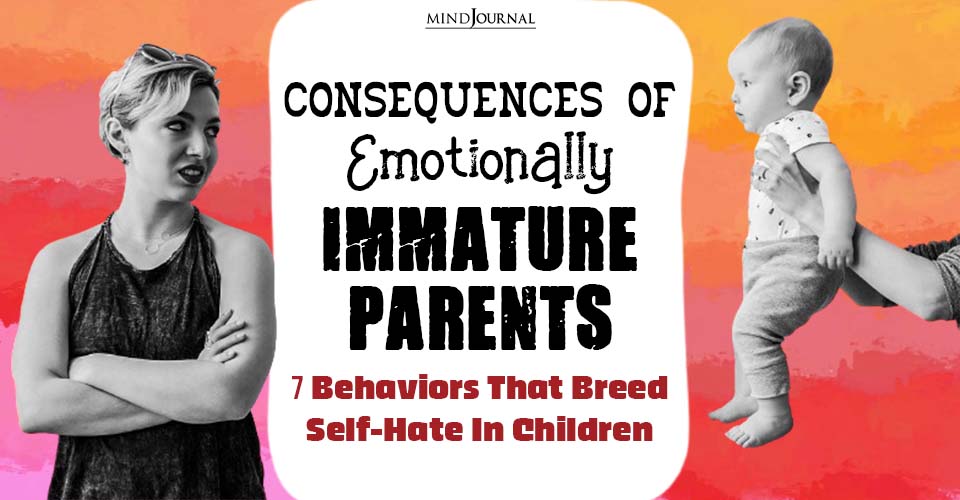What happens when grown-ups who are expected to direct children through life, have difficulty with their own feelings? Children don’t hate their parents—they start hating themselves. That’s why we will learn about emotionally immature parents and the toxic things parents say.
This is crucial for healing and building healthier family relationships. So let’s explore it.

“Emotionally Immature Parents”: What Does It Mean?
The American Psychological Association defines emotional immaturity as “a tendency to express emotions without restraint or disproportionately to the situation”, or having an emotional reaction that a child would have.
In the same way, emotionally immature parents often can’t control their own emotions which may lead them into actions or words that unintentionally harm their children.
Here are seven common behaviors or things toxic parents say that can breed self-hate in children.
Read more here: 7 Words Every Struggling Adult Child Needs To Hear From Their Parents
What Does Emotional Immaturity Look Like? 7 Behaviors And Things Toxic Parents Say

If you’re dealing with or know someone with emotionally immature parents take a look at the things they say or do that make a child hate itself…
1. They Invalidate Their Children’s Feelings
Parents who have not matured emotionally are known to disregard or underestimate their children’s emotions. In this case, a parent might tell their child “Stop crying, it’s just a dog” when they express sadness over losing a pet.
Negating these feelings teaches kids that what they feel is irrelevant or wrong and makes them doubt themselves and their values. Therefore, hindering emotional growth will lead to a lack of confidence in recognizing one’s feelings later in life.
2. They Have An Over Critical Attitude
Their excessively judgmental standpoint and absence of positive criticism can deeply damage a child’s self-esteem. Statements that never let up such as ‘You can’t do anything right’ or comparisons like ‘Why can’t you be more like your brother/sister?’ breed an atmosphere of toxicity.
Kids imbibe these feelings of being unworthy because they are unable to meet their parents’ unrealizable expectations. This unremitting pessimism about themselves eventually affects how children see themselves, thereby lowering their morale and emotional health.
3. Their Love Is Conditional
Dealing with emotionally immature parents means that they only show love and approval for their children when they meet particular sets of expectations or accomplish specific aims.
Such a love, which depends on the children’s accomplishments rather than their personalities, leaves them with one message; that their value as individuals is determined entirely by what they do.
For this reason, kids never stop trying to win recognition from others to feel wanted or cared about — they learn that who they are doesn’t count unless it’s good enough for somebody else.
4. They Lack of Emotional Boundaries
When adults speak excessively to their children about personal issues, they confuse the children’s boundaries and make them feel answerable for their parents’ emotional condition.
This kind of sharing makes kids think that it is in their hands to fix adult problems which then causes them guilt as well as blaming themselves over what happened. Parents should always keep a distinct separation between their own emotional state and those of their kids in order not to endanger the latter’s mental health.
5. Their Parenting Is Inconsistent
Emotionally immature parents show extreme control, sometimes they’re too strict, or sometimes they become overly disinterested. This kind of inconsistency makes a child feel unsafe because it is impossible to predict what will happen next.
Consequently, the kid fails to learn how to trust itself or anyone else throughout life. This irregularity may also affect emotional balance in children and their overall sense of security and happiness.
6. The Child And Parent Reverse Roles
The child is put under immense pressure when the parents seek emotional support from them or make them their confidants instead of their caretakers. This reversal of roles disrupts the usual relationship between children and their parents, robbing kids of having a carefree childhood. It burdens them with responsibilities they are too young to handle.
7. They Have Frequent Emotional Explosions
Parents who let their emotions take over often or respond disproportionately to minor issues make life unpredictable and dangerous for their children.
Such fits of rage may give lessons to youngsters that having feelings is something that should be avoided. And some kids may find it hard to control their emotions and remain calm.
How to Heal From Things Toxic Parents Say
If you think that you have emotionally immature parents, remember that it is not your fault. Here are some things that can help make you feel better.
1. Speak to somebody: Find an adult who you trust such as a teacher or relative and talk about how you feel with them. They might be able to help you understand what’s going on and deal with your feelings.
2. Take care of yourself: Do things that make you happy or calm, like drawing pictures, playing outside, or talking to friends who boost your spirits.
3. Set boundaries: It’s okay to let them know how this makes me feel (even if they don’t always get it right away).
4. Find support: Sometimes talking to other kids who have gone through similar things can help make one feel less alone in the world.
5. Be patient with yourself: Remember growing up/healing takes time – so be kind towards yourself while also recognizing that you deserve love and understanding too.
Read more here: How To Successfully Go No Contact With Toxic Parents? 8 Tips To Follow
Growing up with emotionally immature parents can be really tough, but you’re not alone. By understanding how their behavior affects you and taking steps to heal, you can learn to manage your own feelings and grow into a strong, caring person.
Remember, it’s okay to ask for help and to take care of yourself—you deserve it!










Leave a Reply